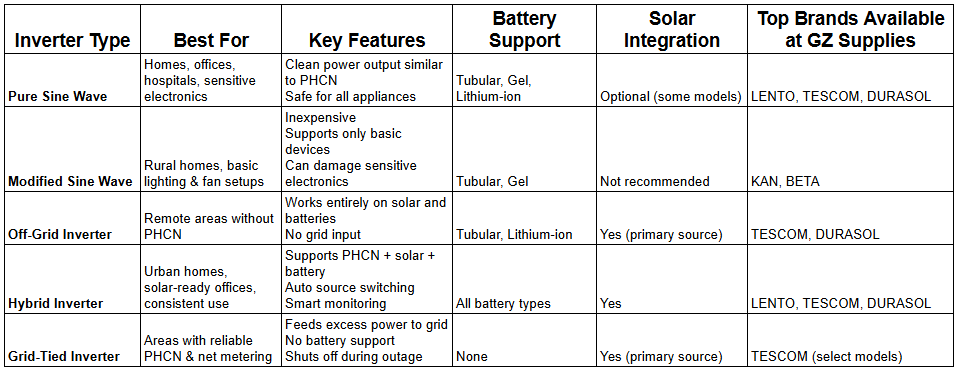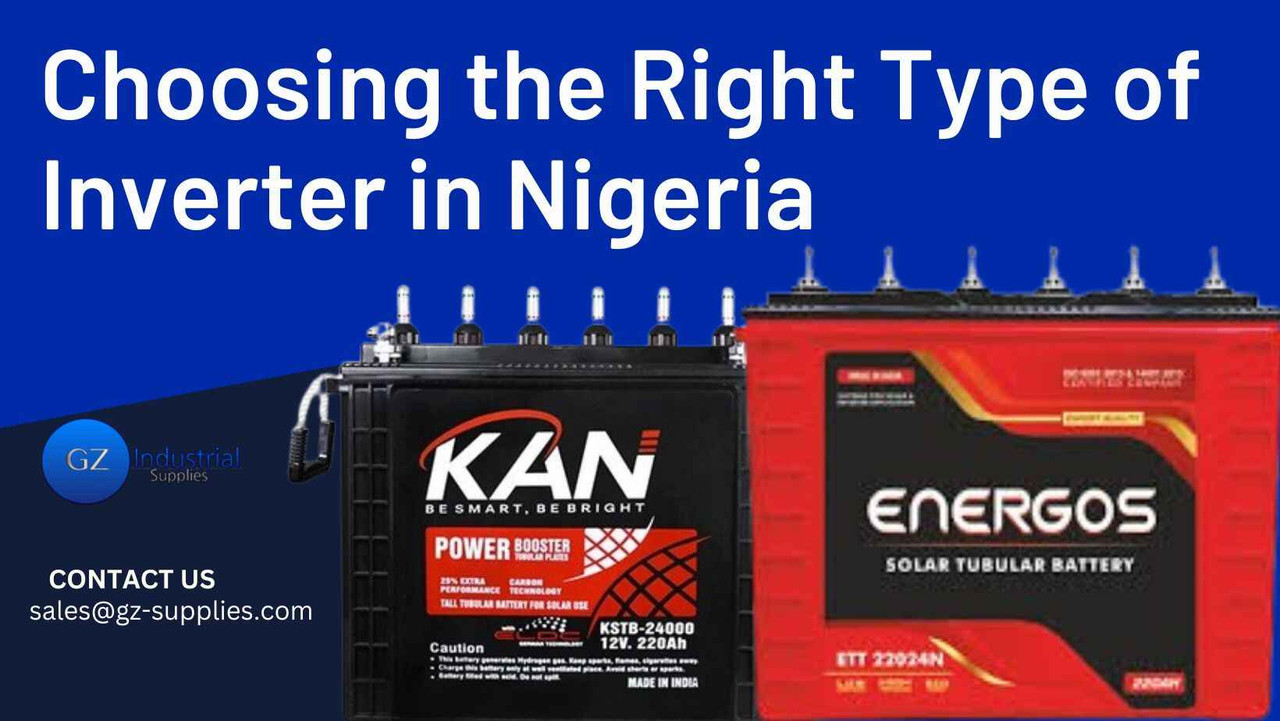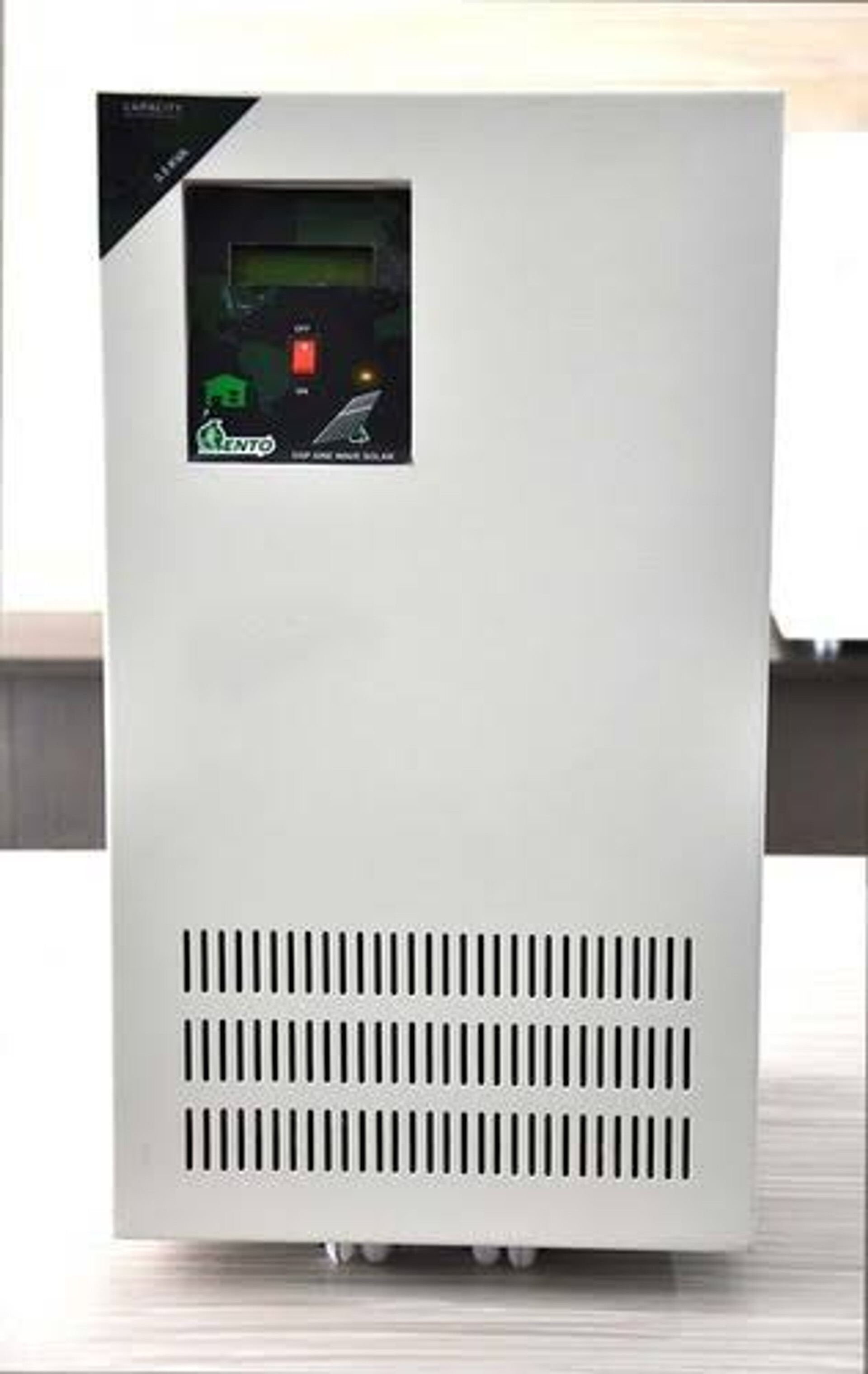Choosing the Right Type of Inverter in Nigeria
Introduction
Power outages in Nigeria are no longer occasional inconveniences, they're everyday realities. With fuel prices rising and generators becoming costlier to maintain, more households and businesses are switching to inverters as their go-to power backup solution. But not all inverters are created equal.
Choosing the right type of inverter depends on what you want to power, how long you need backup, and whether you’ll be integrating it with solar or public grid electricity. In this 2025 guide, we’ll help you understand the various types of inverters available in Nigeria, what makes them different, and how to make the best choice for your needs.
Read more... Inverter: What You Need to Know in 2025
Key Takeaway
- Your Power Needs Determine the Best Inverter Type: Start by calculating the total wattage of the appliances you want to power. This ensures you choose the right inverter capacity (VA or KVA) and avoid overloads.
- Pure Sine Wave Inverters Are Best for Sensitive Devices: For electronics like TVs, laptops, and medical equipment, always choose pure sine wave inverters for safe, stable power similar to the grid.
- Modified Sine Wave Inverters Are Budget-Friendly, But Limited: These are suitable for basic appliances like fans or bulbs but can damage or reduce the efficiency of sensitive electronics.
- Hybrid Inverters Offer Maximum Flexibility: Hybrid inverters combine grid, battery, and solar sources, making them ideal for Nigeria’s erratic power supply. They automatically switch between power sources and optimize energy use.
What Is an Inverter and How Does It Work?
An inverter is an electronic device that converts Direct Current (DC) typically from a battery or solar panel into Alternating Current (AC), which is what most home and office appliances use.
Think of it as a bridge between your power storage system (battery or solar) and your appliances. Without an inverter, you wouldn’t be able to run your fan, lights, or refrigerator from stored energy. Inverters come in various sizes, designs, and capabilities and choosing the wrong one can leave you with insufficient backup, wasted money, or damaged appliances.
Key Factors to Consider Before Choosing an Inverter
Before diving into types of inverters, it's important to understand the core factors that should influence your decision:
Total Power Load
Calculate the wattage of the appliances you want to power. This helps you determine the inverter’s required capacity (usually in KVA). Include:
- Lighting
- Fans
- TVs
- Fridges
- Routers
- Laptops
- POS systems
Backup Time Needed
Decide how many hours of power backup you require. This will influence the battery bank size and inverter rating.
Appliance Sensitivity
Some devices like refrigerators, TVs, or computers require pure sine wave electricity to function correctly. Others like fans or bulbs may tolerate modified sine wave output.
Power Source Integration
Will your inverter be:
- Charged by PHCN (NEPA)?
- Integrated with solar panels?
- Switched with a generator?
This determines whether you need a basic inverter, solar-ready, or hybrid model.
Space and Noise
Some inverter models are noisier or bulkier. Consider where you plan to install it and if fanless or compact designs are preferable.
Budget vs. Efficiency
Inverters range from budget-friendly to premium smart systems. Aim for one that meets your needs without overpaying for features you won’t use.
Types of Inverters and Their Use Cases in Nigeria
Here’s a breakdown of the most common inverter types used in Nigerian homes and businesses, and what they’re best suited for:
Pure Sine Wave Inverters
These generate electricity nearly identical to public supply (NEPA). They are the safest for:
- Sensitive electronics
- Medical equipment
- Fridges and freezers
- LED TVs and desktop computers
Ideal for: Homes, small businesses, offices, hospitals
Available Brands: LENTO, TESCOM, DURASOL
Modified Sine Wave Inverters
These are more affordable but produce a rougher electricity waveform. They work with:
- Light bulbs
- Fans
- Phone chargers
Not recommended for electronics or appliances with compressors.
Ideal for: Rural homes with basic lighting and fan needs
Available Brands: KAN, BETA
Off-Grid Inverters
Designed to work without PHCN entirely, these rely fully on battery and solar power. Best for:
- Remote locations
- Homes with no public electricity
- Rural clinics and farms
Available Brands: TESCOM, DURASOL
Let me know when you're ready for the next 30–40%, which will include:
- Hybrid, Grid-Tied, and Solar-ready inverter types
- A comparison table
- Best recommendations by use case
Grid-Tied Inverters
Grid-tied inverters are designed to work in environments where public power (PHCN) is available. These inverters synchronize with the grid and allow you to feed excess solar energy back into the grid if your area supports net metering (currently in limited rollout in Nigeria).
They don’t work with batteries and will shut down when PHCN fails, so they are not ideal for backup power unless paired with a hybrid system.
Ideal for: Solar farms, offices with consistent power, homes in net metering zones
Available Brands: TESCOM (in select models)
Hybrid Inverters
This is the most flexible and advanced inverter type. Hybrid inverters combine three sources:
- Public power (PHCN)
- Solar power
- Battery storage
They automatically switch between power sources depending on availability, ensuring continuous electricity. Most hybrid inverters also support smart monitoring, allowing you to track usage via mobile apps or control panels.
Ideal for:
- Urban homes
- Solar-powered offices
- Businesses requiring consistent power
- Users investing in energy efficiency
Available Brands: LENTO, DURASOL, TESCOM
Inverter Comparison Table – Nigeria 2025 Edition

Read more...Choosing the Right Type of Inverter in Nigeria
Best Inverter Recommendations by Use Case
For Homes (2–4 Bedrooms)
- Recommended Inverter Type: Pure Sine Wave or Hybrid
- KVA Rating: 1.5KVA – 3.5KVA
- Top Brands: LENTO, TESCOM, DURASOL
For Small Businesses and Offices
- Recommended Inverter Type: Hybrid
- KVA Rating: 3.5KVA – 5KVA
- Top Brands: BETA, TESCOM, LENTO
For Industrial or Commercial Use
- Recommended Inverter Type: Pure Sine Wave with expansion or 3-phase setup
- KVA Rating: 5KVA and above
- Top Brands: DURASOL, TESCOM, KAN
Top Inverter Brands Available at GZ Supplies
At GZ Supplies, we stock only trusted and performance-tested inverter brands that meet Nigerian environmental and power standards. Our current inventory includes:
LENTO
- Durable, reliable, and solar-compatible.
- Known for excellent efficiency and long battery life support.
BETA
- Affordable and beginner-friendly.
- Best for homes or offices on a budget.
TESCOM
- Mid-range to premium quality inverters.
- Excellent for hybrid setups and solar integration.
KAN
- Rugged and efficient for basic power needs.
- Great for modified sine wave applications.
DURASOL
- Heavy-duty inverter systems with advanced features.
- Ideal for industrial use and long runtime requirements.
Installation Tips for Nigerian Conditions
To ensure safety, performance, and durability, keep these guidelines in mind:
- Hire a certified installer with experience in inverter + battery + solar systems.
- Ventilate your inverter and battery storage area to avoid overheating.
- Use surge protectors to safeguard the system from power spikes.
- Keep batteries elevated and away from damp or dusty floors.
- Check terminal connections monthly and clean when necessary.
Frequently Asked Questions
1. What’s the best inverter for a 3-bedroom home in Lagos?
1.5–3.5KVA pure sine wave inverter with a 24V or 48V battery system is ideal. Choose a hybrid if you're considering solar later.
2. Do I need solar panels to use an inverter?
No. You can charge your inverter using grid power alone. But hybrid inverters allow solar + PHCN integration.
3. Can I use an inverter for my deep freezer and AC?
Yes, but you'll need a high-capacity inverter (above 3.5KVA) and a strong battery bank. Also, ensure it’s pure sine wave.
4. How long do inverter batteries last?
- Tubular: 3–5 years
- Gel: 4–6 years
- Lithium-ion: 7–10 years
5. What if I want a silent system for my bedroom?
Go for a fanless hybrid inverter and maintenance-free gel or lithium batteries.
Related Articles
Signs Your Inverter Battery Needs Distilled Water
Navigating the World of Inverter Batteries: Expert Recommendations for Every Need
Conclusion
In 2025, an inverter isn’t just a backup plan, it’s a necessity for uninterrupted productivity and peace of mind in Nigeria. Whether you're powering a home, office, or large-scale facility, choosing the right inverter saves you money, improves safety, and keeps you comfortable.
At GZ Supplies, we don’t just sell inverters, we help you choose the right one, install it properly, and maintain it for long-term performance.









